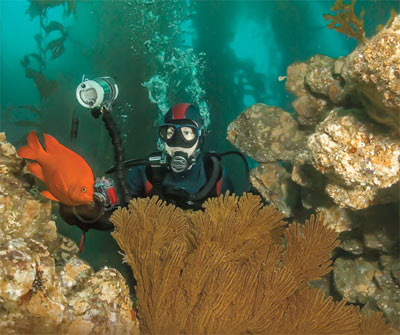When the subject of this editorial first dawned on me, I had an immediate response (and joking) answer: Spend a lot of money. Actually, that’s not it.
How you react to a lot of what I’m about to say will depend on what your view of a dive shop is. And realize that there are plenty of “good” shops out there as well as “bad” shops, but you’ll almost always find plenty of people who classify the “bad” shop as “good” and vice-versa. So what gives?
For those who may not know me, a little background. I was the co-owner of a dive shop (Reef Seekers in Beverly Hills) since 1988. We closed the retail side of our store at the end of 2006 due to a rental lease dispute. And now we strictly concentrate on local and foreign dive trips/travel.
But in those 18 years I was a front-line retailer and developed some very definite ideas of what a store should or shouldn’t be and what a customer should or shouldn’t be. Wait a minute, you’re saying. Why should the dive shop expect anything from ME? Well, it’s a two-way street.
If we’re going to establish a business relationship, the key thing about a relationship is that it places obligations on both sides for the relationship to be successful and to flourish. That doesn’t mean there won’t be bumps in the road. But hopefully, they’ll be resolved.
Now you can stop reading right here if you feel that, as a customer, you’re my boss and whatever you say goes. That’s more of a master/slave relationship and most shop owners I know have too big an ego (there’s a reason we want to be our own boss) to deal with that for too long, no matter how much you’re spending.
What’s interesting is that a lot of the truly Big Spenders (I’m talking people who walk in and drop $5,000-10,000 without blinking) are frequently as sweet as can be and not at all demanding. But it’s the people who THINK they’re your financial savior and that that means you “owe them” who tend to be the biggest problems.
So when I think about this topic I think a lot of this revolves around asking yourself how you can be a good customer. That doesn’t mean you have to give up anything or sacrifice your self-esteem when you walk through the door. But it means that we’re human too and a little consideration towards us will probably pay off big down the road.
With that said, a few things to think about.
WE LIKE YOU, BUT IT’S STILL A BUSINESS: One of the interesting things about the business of diving is that the social side of it REALLY complicates matters. This isn’t like going into Macy’s to buy a shirt. You come into our store, we interact with you a lot, we take you into life-threatening situations, we see you wet and almost naked, we share very special experiences with you… But we do that with EVERYONE. So when you come in and want something, and then follow it up with the magic words, “…But what’s MY price?” we tend to roll our eyes and try to decide what our next comment should be. It’s not that we don’t like you. We do. But it’s a business we’re running.
YES, WE’RE MAKING MONEY BUT WE’RE REALLY NOT GOUGING YOU: I don’t know how this thought gets started but some how people get the idea that dive shop owners are making a killing and we’re doing it at your expense. As I like to say, “It’s an expensive adventure sport.” There will always be someone who sells something cheaper than someone else. That doesn’t mean you can’t bargain. That doesn’t mean there might not be some wiggle room (but it also may mean buying something else). But look in our parking lots and you won’t see Mercedes and Lamborghinis parked there (unless they’re yours). Most dive shops are owner-operated and the owners frequently don’t have a pension or something to fall back on because the profit margin on a dive shop isn’t anywhere near what most people think it is.
BE REASONABLE: The squeaky wheel does not always get the grease. I guarantee you that if you came into my store yelling and screaming and telling me what a jackass my employee was or how we had ruined your dive or whatever, you weren’t exactly going to be starting with a sympathetic ear. However, if you came in and said, I have this problem, outline it and ask, “Can you help with this,” I’m going to be a lot more receptive. Treat me the way you’d like to be treated if the roles were reversed and you’ll probably stand a better chance of getting some sort of resolution that you will feel is fair.
And I’m just getting started. Next month, part 2.










